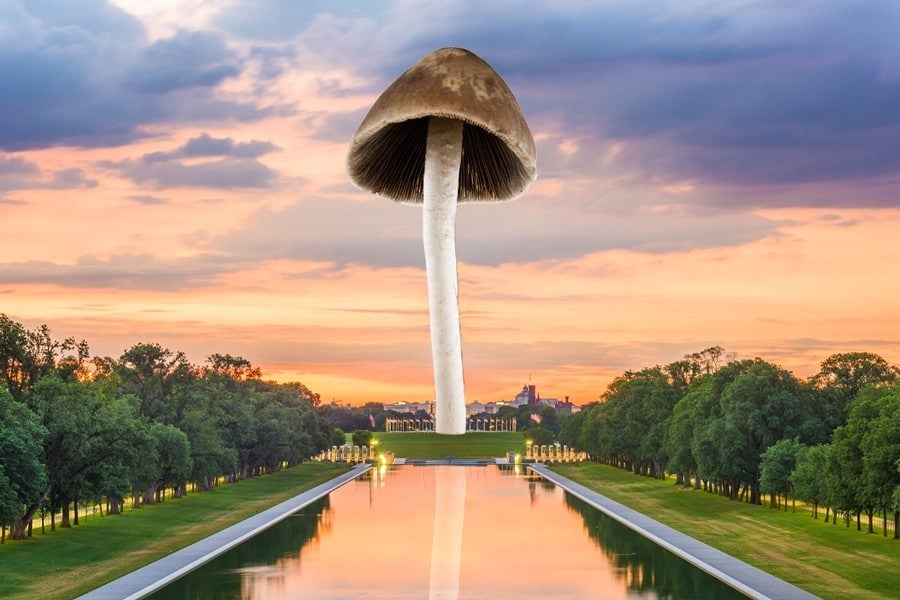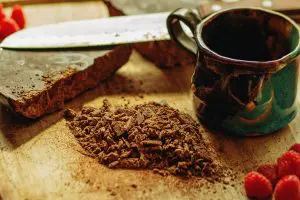Melissa Lavasani, a D.C. government employee and mother of two young children, isn’t the figure you’d expect to find behind a ballot initiative for decriminalizing plant-based entheogens like psilocybin, mescaline, iboga, and naturally-occurring DMT. Until a few years ago, she’d never tried a psychedelic drug, but, faced with severe postpartum depression, anxiety, and suicidal thoughts (“very quickly,” she told DoubleBlind, “my life was starting to spiral out of control”), she turned to microdosing shrooms and taking guided ayahuasca trips in search of healing. And she did heal.
With psilocybin mushrooms, her depression and anxiety began lifting almost immediately. “I was carrying myself differently; I was speaking differently,” she said. In ayahuasca healing ceremonies, Lavasani had what she called “some of the most profound experiences of my life,” which helped her digest pain and propel herself forward. “It was really revealing,” she says of ayahuasca. “It made me a better person.”
At the same time, Lavasani lived with the fear that she could lose her livelihood, her family, and everything else she’d worked for because entheogens, or the chemicals they contain, remain listed as Schedule I drugs. And as she learned more about their uses, she discovered that there were others in her D.C. community who had found relief from depression, anxiety, PTSD, and addiction with the help of entheogens. Research out of Johns Hopkins, MAPS, and other institutions backs that up.
Lavasani founded Decriminalize Nature D.C. in 2019 to put the issue to the District’s voters on this November’s ballot. Known as Initiative 81, the proposed law would classify naturally occurring psychedelics, “among the lowest priority for law enforcement”—a sort of de facto decriminalization that would allow D.C. residents to access plant medicine with less apprehension. “People should be able to heal themselves without the feeling that they could lose it all,” said Lavasani. The initiative would apply narrowly to plant-based entheogens, not LSD or other synthesized compounds.
With the help of a team of volunteers and $500,000 from Dr. Bronner’s, Lavasani and Decriminalize Nature D.C. collected over 36,000 signatures—ten thousand more than required—during the height of the pandemic lockdown and in its immediate aftermath. They pulled off this unlikely feat by petitioning D.C. City Council to include provisions for remote signature-gathering as part of the city’s pandemic legislation and by canvassing in person with safe social-distancing protocols.
Read: Everything You Should Know About the Campaign to Decriminalize Naturally Occurring Psychedelics
The campaign turned in the signatures on July 6th and awaits the 30-day validation period by the D.C. Board of Elections so that the measure can appear on November’s ballot.
How to Grow Shrooms Bundle
Take Both of Our Courses and Save $90!
Decriminalize Nature D.C. has faced little opposition within the local community and the organization has what Lavasani describes as a “great working relationship,” with City Council, Delegate Eleanor Holmes Norton (D.C.’s silent Congressional rep.), and the Board of Elections.
But then there’s Rep. Andy Harris (R-MD)—a Drug War politician known for the “Harris rider” that effectively blocked legal cannabis sales after D.C. voted for legalization in 2014. Harris initially indicated opposition to Initiative 81 but, according to Lavasani, has since dropped the issue due to a lack of support in the House Appropriations Committee.
Leading up to November, Decriminalize Nature D.C. plans to carry on its mission to educate the public and change minds. Though the pandemic introduced a huge logistical challenge to the campaign, Lavasani believes that it’s also opened space for increasing numbers of people to talk about self-care and managing feelings. “Everything is thrown out of whack right now,” she said, “and that’s driven a lot of conversations about mental health.”
Referencing Drug War propaganda, Lavasani said that many people still fear psychedelics will trigger insanity or schizophrenia, or that they’ll change a tripper’s personality. But she also noted that her community has been more receptive to an educated take on these substances than anticipated. “When you talk about psychedelics in the frame of therapy for a mental health issue, so many people open up because mental health is something that everyone has to deal with in one form or another,” she said.
Read: How Oregon is Leading the Country in Drug Policy Reform
When asked to compare the psychedelic decriminalization movements around the country (examples include the psilocybin-specific one in Denver and the broader Decriminalize Nature one in Oakland) with the recent wave of U.S. cannabis legalizations, Lavasani said she leans toward a more “thought-out” road than the one cannabis has gone down. She hopes psychedelics activists around the country will lead with education and information, and that the movement won’t leave the most marginalized people, such as communities of color, behind in the process—something the legal cannabis industry is unfortunately well-known for.
If Initiative 81 passes this fall, the organization will consider next steps, including the possibility of supporting another, more comprehensive drug reform measure. But for now, they’ve chosen an incremental approach, counting “little local victories” as steps in the right direction. D.C. may be known for liberal politics, but socially speaking it’s more buttoned-down. “If we came out of the gate hot with broad drug reform, a lot of people wouldn’t hear us—and we wouldn’t have much support on D.C. Council,” said Lavasani, citing the city’s painful history with PCP, crack, and opioids.
Decriminalize Nature D.C.’s steering committee includes a criminal justice attorney, a federal healthcare lobbyist, and community organizers, among others; women sit on the committee, as do members whose identities reflect the diversity of D.C. itself. “The psychedelics movement has been run by white men,” says Lavasani, who is the daughter of Iranian immigrants. “As a woman leader here, I thought it was important that we, in this campaign, boost up all voices.” To be successful, she believes, the entheogenic movement has to represent a broad range of people and interests. “I think we’re going to end up creating better, more inclusive policy when these voices are represented from the get-go.”

DoubleBlind is a trusted resource for news, evidence-based education, and reporting on psychedelics. We work with leading medical professionals, scientific researchers, journalists, mycologists, indigenous stewards, and cultural pioneers. Read about our editorial policy and fact-checking process here.

DoubleBlind Magazine does not encourage or condone any illegal activities, including but not limited to the use of illegal substances. We do not provide mental health, clinical, or medical services. We are not a substitute for medical, psychological, or psychiatric diagnosis, treatment, or advice. If you are in a crisis or if you or any other person may be in danger or experiencing a mental health emergency, immediately call 911 or your local emergency resources. If you are considering suicide, please call 988 to connect with the National Suicide Prevention Lifeline.



